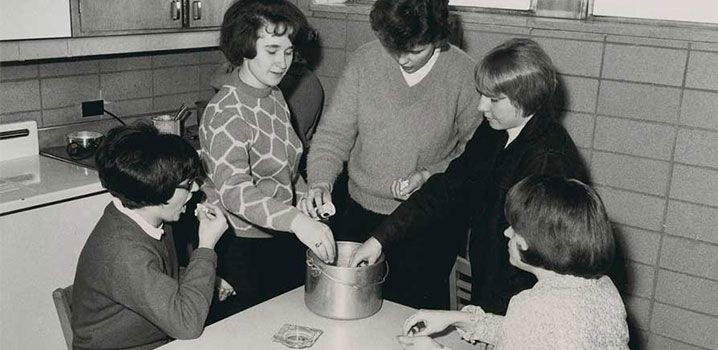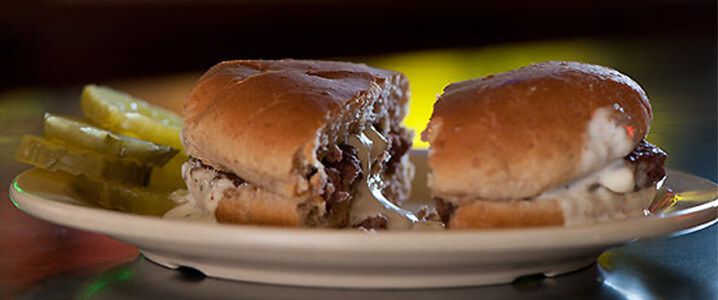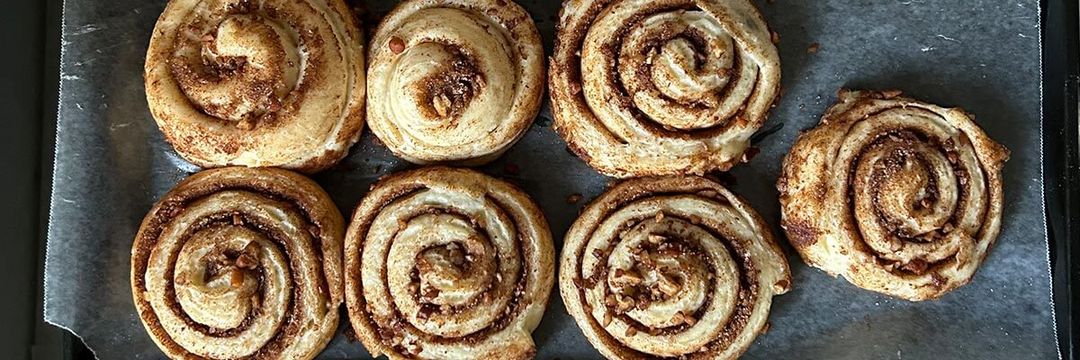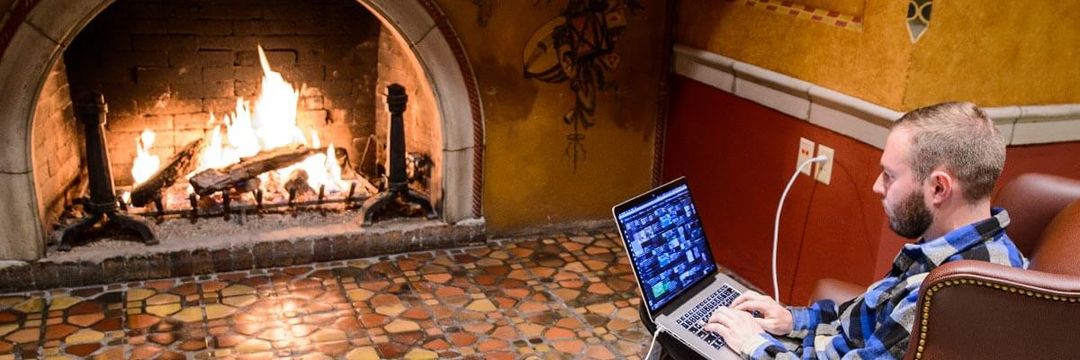A UW education is among the best in the world. Not only do Badgers learn such mundane topics as vertebrate anatomy, philosophy, and quantum physics, but we also learn more practical things: how to operate a black market in meal tickets, for instance, or where to set the profit margin on beer sold to freshmen.
We asked you, our readers, to tell us your strategies for surviving the poverty of studenthood, and your responses reveal tremendous ingenuity, as well as a noble stoicism in the face of 365 consecutive bologna-sandwich lunches. If a student can manage to follow all of these tips, he or she should be able to pass four years at the UW, needing nothing more than $1.50 and a resistance to scurvy.
1940s
I washed pots and pans in the kitchen of Ann Emery Hall on Langdon St. and worked in the office of the Associate Dean of the College of Agriculture.
—Dale Bruhn '48, MS’74
Delray Beach, Florida
1950s
Near the end of my Freshman year at UW-Madison, my mother was hospitalized over an extensive period. My father was a blue collar worker in a paper mill in northern Marinette County. My brother came home from WWII and decided to go the college at the same time that I enrolled.
I knew my parents could not continue to send me support money. So I went to the Student Employment Agency and applied for a job .... any job. The administrator referred me to a gentleman looking for a "House Boy." I got the job and worked really hard at household, yard maintenance and washing and waxing his car and truck. I helped with kitchen duties and cleaned the house. No salary, just room and board. It was about 30 hours a week, but I did not keep time records. This means I was self sufficient for the last three years of my BS Degree.
During the summer I got a full time salary of about 75-cents an hour. From that, I was able to save $400 to pay two semesters of tuition and books (Yes, I know it cost a lot less in those days, but remember, it is all relative.)
Surprisingly, my grades went up! Every minute counted! I re-wrote my "To Do List" three times a day. I memorized my text book outlines on the bus during my morning and evening commute. I enjoyed a private room with perfect study conditions.
This severe time management formed habits that I put to good use years later in my advertising agency business career. I also implanted this new-found work ethic with my four biologic children and two stepsons. It is still serving all of them very well, because all six came out of college without a college debt and they all enjoy personally rewarding careers.
We are now working on college for the 10 grand children (Thanks EdVest), with the three oldest working on their Masters and Doctorates.
—Bill Waldbillig ’54
Madison
As a teenage boy, I knew the only way I would get a college education was to work as a Green Bay Press Gazette paper boy, and at the same time deliver prescriptions all over Green Bay for a local clinic, even when it was 20 below zero in the winter time. Then I went to the University of Wisconsin Extension Center in Green Bay for my first two years, while working at a cannery. Then on to Madison for my junior and senior year, while working part time jobs. After graduating I worked that summer as an intern for a government agency in Washington, D.C. and then on to Lancaster Theological Seminary in the fall. While attending the seminary I earned income by serving as a student intern each summer.
—Larry Rezash ’52
Miamisburg, Ohio
When I first attended UW, everyone knew which school you were talking about without saying "Madison;" it was some 60+ years ago. I rented a room near Madison General (now Meriter) Hospital and after packing my brief case (no backpacks), I walked South Park Street to where-evers. Cold winter days were somewhat challenging. Breakfast was at a University Ave small cafe where a meal ticket cost about $10, of which I allotted $1.75/day for M-F meals (50 cents each for breakfast and lunch, and 75 cents for supper). I scrounged on S-S depending on where I was. I weighed in at 153 lbs. then, and it was no problem with staying in shape.
I rented my room from an elderly lady near Madison General. It cost $5/week and was supplemented by 50 cents a day from advanced ROTC payment. With $500 saved, and working about five hours a week, plus good jobs in the summer in construction, I was able to pay for all my costs. Tuition costs, of course, exploded when I got to Med School: somewhere around $100/semester as I recall! In 1958 when we returned to Madison for residency, now married, we reveled in a stipend of $50-$125 per month. But by then we were on our way. When I graduated in '54 and '57 we were debt, if not fancy, free!
I still love the Badgers and live with the same (student) nurse I ran into one Sunday morning, near MGH. I never thought of being blessed with 20 years of retirement, but here were are. If I have any advice for the latest generation it would be summed up in several words: Commitment: God, Family, Country. Wishing you all the blessings of that knowledge.
—Robert W. Pointer ’54, MD’57
The Villages, Florida
I really was poor during my days at UW-Madison. There were a number of ways to save money, and I did my best. First and most difficult, I graduated in three years instead of four, taking a class overload each semester and taking a couple of extra classes at summer school in Milwaukee (I believe it was called Milwaukee State Teachers then). I worked part time at Harry Harlow's primate lab during the school year. And I sold my football tickets in order to buy just the basic supplies I needed. Those were tough times.
—M. Judith Bernfeld Roy '56
Baileys Harbor, Wisconsin
I was a student on campus from 1947 t0 1951; from 1955 to 1956; and as a grad student in 1960 to 1961. Initially I had a restaurant job two hours a day for the two main meals. I ran the dishwasher, but moved up to doing the pots and pans, clean the steam table, and scrub the floors after-hours. I was given a key to the place and could name my own hours.
I quit that, and worked at the Ag Hall Library evenings and weekends. I worked for my landlady painting, cleaning, and even wall papering. (Have you ever tried wallpapering a stairway from the first floor up to the third floor? Fun! Fun!) In those days one sent one's laundry home in a fibrous or aluminum case at the Rennebohm Drug Store at State and Lake Streets on Saturday mornings. Mom would do my laundry and send it back with non perishable goodies surrounded by clean clothes inside the laundry case. After four years in the Air Force, I returned In 1955 and now had the GI Bill, but still worked after-hours at the Ag Hall Library.
In Grad School, I shelved books at the downtown Madison Public Library then located on Carroll Street of the Square in downtown Madison. I was married with an 18-month old child. We rented an upstairs flat in a farmhouse out beyond the Beltway towards Verona. My wife taught in a one-room school. Our landlady babysat for us. Second semester I commuted daily to Janesville where I was a student intern. That Christmas we could not even afford a Christmas tree nor any presents except for a set of blocks for our son.
—Jerry Abitz ’56, MS'61
Luxemburg, Wisconsin
Meal job at "girls house." Busboy at local restaurant. Worked at bacteriology department filling plates with media. No new clothes. No scholarship. Just plain frugal.
—Alfred Meyers ’53
Milwaukee, Wisconsin
Your question brought back a lot of memories from getting up very, very, early to work at the Union on a cleaning detail to meal jobs at Victoria House and Villa Maria. At times classes were secondary to various jobs from selling shoes downtown, driving cab and working at a laundry mat. In retrospect I think it all contributed to make my time at UW very special.
—Gene Helfand ’57
Naples, Florida
I fed rabbits at the School of Agriculture. This was back in the early fifties. If rabbits are still raised, feeding is probably automated!
—Helen Macgregor Baker '53
Montgomery, Illinois
Here are a couple of the strategies we used to make it through the University of Wisconsin back in the late 40's: 25 of us lived in the cooperative Babcock House on Lake Street during the late 1940s and 50's. We had only one small bathtub and no shower. Thus we each bought a University towel and walked one-and-a-half blocks to the Red Armory to take our regular weekly shower, turned in the towel, and got a fresh clean one to use for the next week.
Laundry was a problem living in the cooperative, for we had no washing machine or dryer. Thus I purchased a metal mailing case and packed up my laundry each week and shipped it home to my mother near La Crosse for 18 cents. It then came back to me from my mother all clean and pressed with a package of cookies included.
—Ted Tibbitts ’50, MS’52, PhD’53
Madison
I worked for my meals in the kitchen of my fraternity, SAE, doing the pots and pans for the cook, Mrs. Meinike. The bonus,a well kept secret, was that I had a key to the kitchen, and thus the fridge. Midnight snacks for cramming sessions saved more pennies.
—Richard Linke ’58
New York, New York
1960s
My twin brother and I rented a room in a private home on West Johnson street for $10 each per week. We each bought a weekly meal ticket for $5 at a restaurant on University Avenue. Most weekends we would go home to our parents farm in Sauk County and help with the chores for meals eaten there. Our budget was $1,000 per school year. Tuition was $150 a semester. We earned our money by working at American Motors in Kenosha during the summer months. The company would let us return every summer.
—Marvin ’63 and Melvin ’63 Heiser
Both of Madison
I rented a room in a private home at 1502 Adams Street. Breakfast was cereal in my room. I went to a Malt Shop two blocks away for supper – hamburger & malt for 35 cents. I walked everywhere, as I had no car. I think tuition was $110 a semester. My mother lived in Hudson, Wis., and was widowed and on welfare. Thanks to student loans and summer jobs I was able to graduate. My student loan total was $1,200.
—Sheldon Bearrood ’62
Bella Vista, Arizona
When I entered the University in 1950, I had a hot plate, a dented pan, and little else, so I worked for my breakfast and lunch at a sorority across the street on Langdon Street, and managed to survive on soup and peanut butter sandwiches, bought when I managed to snag a few typing jobs for other students. After I married, I dropped out of school for a couple of years before re-entering UW as a part-time student during its summer sessions. Every summer, my husband took graduate classes (and worked a ten-hour night shift at Gardner's Baking Company to support our family). It was tough, living in a third floor, tiny suite in a fraternity house on Langdon Street which rented places to grad students. With no in-house laundry facilities, I piled our baby buggy full of diapers and dirty clothes and took the whole mess to a laundromat on State St. Later on, our kids went to summer school, too, sponsored by the Home Economics Dept., which helped us schedule our classes more efficiently. (One friend of mine had an even more difficult time: she lived in the Tent Colony with her six children every summer!)
Eventually, after six summer sessions, we returned to school full time so my husband could finish his Ph.D. and I could keep working on my undergrad degree. That time we lived in Eagle Heights, a blessed place, although pretty small for a family of six! In 1964, I received my B.S. and started work on my M.S., and finished up in the summer of 1967. Somehow, with lots of "slum-gooey," the name we gave to countless hot dishes (constructed of lots of noodles, canned peas, cream of mushroom soup, and one small can of tuna) we managed to survive. In spite of the hardships, after we packed the car once again to return to the UW, our motto was always "Off to a New Adventure"! From start to finish, It was a wild 17 years for me, but worth every single minute. Why? I got the best education in the world from my beloved UW!
—Mary (Hawley) Sasse ’64, MS’67
Carbondale, IL 6290
Four of us lived in an apartment on Francis Street, our first apartment after the dorm. I remember shopping for cereal, milk, and a grocery bag full of pot pies! To this day I can't think of eating another one of those delicious gourmet treats. We also had lots of that American Icon, "Spam!" We combined that with potatoes and canned veggies. We got free cans of vegetables from one roommate's family that worked in a canning factory. We got the cans that didn't have labels so it was a "vegetable surprise." Our real treat was ordering pizza on a rare evening and always had enough for breakfast the next morning. In all of our efforts to be thrifty, somehow we always had a few extra dollars to go to the KK for a beer or four on Friday evenings! Oh the good old days.
—Barb (Forton) Zander '69
Stoughton, Wisconsin
I lived in a single room in an old house on West Wilson. The laundromat was at Doty and Bedford, about two blocks away. After washing my clothes, I carried the damp clothes home to save the cost of drying. Damp clothes are really heavy. I hung the damp clothes on clotheslines strung around my room. At least I had a well-humidified room.
—Bruce Becker ’67
Mendota Heights, Minnesota
My impoverished days as a journalism student seem like yesterday. I was working my way through college. I completed three semesters at the UW Center in Sheboygan, then moved to UW-Madison where I continued my education from 1961 of 1964.
I first lived off-campus in a very nice rooming house on Frances St., later lived in a rooming house near Camp Randall. After that I had a place on Mendota Court, where the landlady startled us one November day by bursting into our room to announce "Boys, the president has been shot."
In 1962 I joined an eating co-op in the basement of St. Paul's Catholic Church, on State St., I think. There were about 120 of us in the co-op. We got noon and evening meals Monday through Friday and a noon meal on Saturday for $11.50 a week. And we could drink all the milk we wanted. All of us had to take turns waiting tables or working in the kitchen or scullery. I loved it! It was ecumenical. Along with Catholics, there were Protestants of every persuasion, Jews, and at least one Buddhist, who roomed with me for a while. The co-op officers were a couple of Methodist students majoring in business. They were — um — very methodical.
On Sundays I would go to the Kollege Klub where I would eat summer sausage sandwiches and drink chocolate milk while watching the Packers devour the bum of the week.
When I graduated in 1964 tuition was $150 a semester. I moved to Chicago to accept a job at the Tribune, one of the city's four dailies, for $120 a week. It was a struggle living on that while paying off college loans of $2,500. There were a lot of young, impoverished people trying to make it in the big city, so I had lots of company. Three of us guys lived in a one-bedroom apartment. And there were times groups of us would go to a restaurant called the Hoe Kow where seven of us would share five entrees. We took advantage of every freebie we could and drank our beer at the Billy Goat.
The usual apartment for people like us had bookshelves made with cement blocks and furnished with stuff that even the Salvation Army would sneer at. And the party meal was always — ALWAYS — lasagna. And it was delicious! Those were the good old days. Happy to say, I am now comfortably retired.
—Steve Maersch ’64
Greendale, Wisconsin
We moved into our apartment on Gorham Street in the summer of 1968. There was plenty of room, although one of the boyfriends insisted on painting the bathroom sink because he thought it was too gross to use. We knew a lot of people who had lived off hot dogs and rice when they switched from the dorm to an apartment and we were determined to not let that happen to us.
That summer the four of us each put in $10 for a trip to the store to buy 'basics:" flour, sugar, canned goods, dish soap, paper towels. Once we moved in, we each put in $5 per week for our grocery budget. Keep in mind that in 1968, bread was 25 cents a loaf and hamburger was less than 50 cents a pound.
Diane's mother cleaned out her kitchen and sent all kinds of pots and pans and utensils. It took me 10 years of marriage before I had such a supply! We also came armed with recipes for casseroles. Basically, we ate like royalty, even roasted three turkeys during the year ... lots of left-over possibilities for turkey!
We also acquired a dog, and I kicked in an extra $5 every week or so to keep Charlie in food.
—Sue (Seymour) Swanson ’69
Apple Valley, Minnesota
Six of us lived in the four bedrooms of an old house on Murray Ave. less than a block from the Library. We had a metal bowl popcorn popper that we would heat a can of chili in and would add a can of corn for "chili-con-corny." We kept milk in the window sill during the winter.
—Bob Graham ’67
Albert Lea, Minnesota
No cell phones or internet, no microwaves in the dorms ... sounds like the dark ages right? To save on weekend and late night meals, I had a stash of Campbell’s Soup and Dinty Moore Beef stew in my Elm Drive A (now gone) dorm room. I used my electric popcorn popper to cook up those delicacies! Thinking of that wonderful dorm time also brought to mind those Sunday night “collect calls” home to my folks.
—Annette Van Veen Gippe ’69
Chicago, Illinois
In the late 50's, the university required us to live in supervised student housing until we were seniors, so my roommates and I didn't have the opportunity to really get creative with penny pinching until then. We pooled our meager resources to rent an apartment that required keeping a dresser in the kitchen and sidling sideways into the rusty metal shower stall. We used my aunt's discarded drapes to sew a makeshift slipcover over the lumpy couch in the living room, and mostly cooked in an electric frying pan since the stove was chancy at best. A break from peanut butter and mac'n'cheese was the "Specialty of the House"... a huge bowl of tuna salad that we would whip up after classes on Fridays and then would invite friends to help us devour after we had securely locked down the campus bars. Fine dining on the cheap!
—Lynn Gadzinski ’63
Jefferson, Wisconsin
I had a meal job at a sorority house when I was a student at UW-Madison. That way I never went hungry. Fully one-third of the prepared food never left the kitchen. There were eight on the staff and about 24 girls at meals.
—William Holland ’64
Dearborn, Michigan
Students today have no idea how to slide through to a degree with very little money. I lived in the least expensive private dorm (read: very cheap fire trap) after missing out on the lottery for a university dorm (and women had to live in dorms until they were 21.) Every day I packed a lunch from the dorm kitchen (always bologna sandwiches, same every day). My boyfriend was even poorer than I was, so I shared my bologna sandwiches with him. I think my sandwiches kept him alive. The housemother probably suspected, because she said “for a small-sized girl, you have a very big appetite.” Was it stealing? Or charity? Either way, it was worth the risk. That boyfriend has been buying me elegant meals – no more baloney sandwiches – for 53 years.
—Phyllis Poullette MacDougal’60
Austin, Texas
I would go to the bank on the corner of University and Johnson, exchange bills for rolls of quarters and dimes and sift out the silver coins before they were replaced with "sandwiched" alloy coins. Coin shops would pay 10 percent over the face amount. On a good week, with a few turnovers of my working capital, I could net $15-20! Along with sweeping the sidewalks in front of The Towers and McNeil and Moore, I was in "fat" city, e.g. more dough for Gargano's.
—Peter Brown '69
Palm Beach, Florida
A bit ashamed to say that having a fairly rich and indulgent father made for a very cushy Madison experience. I just thought that is the way life is and will always be. My wake-up call came later when I left college and was out on my own. This meant a cardboard box for a bedside table, another cardboard box for a table, and a thin mattress on the floor. It meant sharing a flat with a girl who commanded the only bedroom, it would appear to carry on her trade (no joke).
These were perhaps the happiest days of my life so far.
—John C. Voss, Jr. ’69
Ponte Vedra Bech, Florida
I lived in a rented house with four other guys who luckily knew how to cook. One made a big pot of chicken soup on Sunday and ate it through the week. Another had a rice cooker and made large batches. Also frozen chicken pot pies bought by the case. One other benefit, I could host parties for my friends who lived at home or dorms.
—Russell Mueller ’65
Spotsylvania, Virginia
The University of Wisconsin offered its graduate school students teaching assistantships in 1962-1964, starting in the first year at $190 per month that rose to $230 per month in the second year. Living on about $7 per day was a challenge.
However, the Newman Center in their ground floor area offered an "Eating Club" — Lunch and Dinner, Monday through Friday, and Lunch on Saturday, in exchange for your services and a payment. Week one duties consisted of serving the food prepared by a paid cook, week two duties were washing the dishes and cleaning up, and week three, seated at table. Obviously, those serving and washing also ate. The cost, $7 per week.
—John D. Corcoran PhD'67
Cookeville, Tennessee
I should probably request anonymity because if my mother reads this, she might kill me.
In my days on campus, penny loafers were popular. Mom would give me bus money so I wouldn't walk home in the dark. I'd put the dimes in my penny loafers and most days used them to buy candy bars and then walk home. As far as I know, she never knew I did this!
��—Tina (Christine Jafferis) Lund '66
Las Vegas, Nevada
We walked or used public transportation for long distances — no cars. We ate/drank what we were served, It was rare to buy extras, use a vending machine, or carry around drinks.
—Carol Claybaker ’60
Janesville, Wisconsin
One of my silly strategies to “save money” or at least get by was to buy new clothes at Redwood and Ross, on account (this was before credit cards), and therefore not need to pay to wash my existing clothes. I ended up with a couple dozen shirts and slacks this way. When my parents sent a $20, I put it on my bill at the Pub. Sad but true.
—Jeff James ‘64
Palmyra, Virginia
Kraft macaroni and cheese, five boxes for $1.00 on sale at Rennenbohm's using Oleo (the butter-like coloring was packaged separately as required by law back then).
—Bob Isenberg ’68, MS’82
Tacoma, Washington
To help with expenses, got a meal job at Lowell Hall, where the food and the "scenery" were both delightful!
—Howard Labow ’68
San Diego, California
1970s
For two years I rented out a room which was a walk in closet in two different places with friends. It had no heat in the room. The only way to get heat was to leave the door open so the heat from the nearest room heat could come in. I also for a year and half while in one of the closets I cooked and did art projects by using a coil you put in water to heat whatever. This helped to heat the room too. In both you could only stand up in one part of it. But both had small windows. In the later one, one of the other roommates grew pot. For $60 a month plus utilities and phone it saved a lot of money.
—Charlotte Chatfield ’78
Hatboro, Pennsylvania
As a high school senior in April 1965, I chose to go to Madison instead of the state school I planned on. In that era, freshmen had to live in UW approved housing. Due to the late decision, no dorm housing was available. That left approved rooming houses. I found an authorized house on Randall Court owned by an aging widow. Available was an upstairs bedroom renting for the princely sum of $25 a week. Included were a bathroom everyone used and a first floor phone everyone used. It was near Camp Randall, lecture halls and Jingles Stadium Bar. What could be better?
Food was not allowed. Thankfully, I learned of an eating cooperative operating out of the basement of old St. Paul’s University Chapel, as it was then called. I think it cost $10 per week, for lunch and dinner, M-F. The proviso was weekly one meal you had to be a food server and one meal a worker in the kitchen prepping and cleaning (God, I so remember the grease trap cleaning. Made my Dodgeville farm boy days seem clean and easy.) For a rural kid, with no college fund, this was a sweet deal and an incredible bang for my buck.
In reflection, the experience outshined the thriftiness. Being 18 and culturally sheltered, I was exposed to incredible diversity at the co-op. There were maybe 80 members. Fewer than five of us were undergrads. Before and during meals, I was exposed to the astounding intellect of global doctoral candidates, deep, free ranging discussions and exposure to an incredible composite of world cultures. It was immersion learning at its best. I could never have gained those insights, had I not needed to squeeze every penny for all it was worth. I not only stretched my dollars, I stretched my mind. What could be better? Now, if I could just get those grease traps out of my memory ...
—Kramer Rock ’70
Green Bay, Wisconsin
Mine was very simple. I don't know how dorm residents pay for food now, but we had meal tickets in the early 70's. I paid the lowest rate, getting the fewest tickets, then bought extra tickets as needed from other dorm residents toward the end of the semester.
—Bill Kurtz '73
South Milwaukee, Wisconsin
What we (my roommates and I) did to stretch our pennies: Anything that was “all you could eat” we would ravage. We especially liked the all you could eat spaghetti at IHOP, because we were living on Gorham at the time. It wasn’t very good spaghetti, but it did fill our bellies and we didn’t have to walk too far. Free popcorn at bars on State Street (Brat & Brau?) We would order one beer, chow down on popcorn, and then take turns running back to the apartment to drink mass quantities of water because the popcorn was so salty and we could not afford a second beer and then return to the bar for more popcorn while still nursing that first beer.
We lucked out and had a roommate who had a job at the Ovens. After closing he would bring home garbage bags full of croissants and left over salad.
When we were living on Mifflin Street, we would buy two cases of Huber beer for $5 (plus deposit on the bottles for the first two cases). Then we would charge ourselves 17 cents a beer and when we had saved up $9.00 over and above the cost of two more cases, we would go to the beer depot and buy a quarter barrel of beer. I believe it later went up to 20 cents so we could have more parties and because one of the roommates paid in IOU’s.
—Rick Romano ’74
Canon City, Colorado
I always ran out of money at the end of the month. I got a monthly paycheck from a research project I worked on at the Pharmacy school, but after rent for a porch I slept on on Monroe street for a year in Pharmacy School, I always ran out of food before the next check. So I always made sure that I had a large supply of popcorn which was very cheap to finish out the month. Very filling and I could go for several days on it. Needless to say, the day I got paid was special in terms of eating. But I loved my days at the UW and left there with a medical degree years later. I have never taken anything but popcorn for granted the rest of my life.
—Dale Nelson MD’76
Spokane Valley, Washington
Waitressing to pay for school and thus getting free food.
—Cyndee Spear
Manhattan Beach, California
During freshman year, when the money on our meal tickets for Gordon Commons had dwindled to a level that clearly wouldn’t be sufficient to make to the end of the semester, we resorted to buying two slices of bread, a hard-boiled egg and then using the free mayo packets to make egg salad sandwiches. That 80 cent meal kept us going until the next semester’s funding arrived.
—Kevin Colgan ’78
Cary, North Carolina
I sold my meal tickets. The meal package was way too big for me. I was easily able to live on half my tickets. At $10.00 a card that was pretty good money.
—Deb Myers ’79
Lake in the Hills, Illinois
Growing up in Wisconsin during the 50’s through 70’s, we never thought we were in poverty. As kids we dreamed of going to a Milwaukee Braves game, but the Knotholer’s club price was 25 cents, way more than our family could afford on a luxury such as a baseball game. I definitely wanted an education to afford that. A luxury.
I worked second shift as a laborer in a factory outside Milwaukee during high school to save for college, and the off to Madison in 1974. I bought the cheapest meal service one could with the dormitory offering. The meal tickets were worth $10 each and tax free. The “rich kids” from Wauwatosa, Mequon and the east coast parents concerned their children would eat too little, bought the highest level of plans.
Unwitting parents did not know their freshmen were selling their $10 meal tickets for $6 to guys like me to have cash for the bars (18-year-old drinking age then). I got an immediate 40 percent food discount, and BTW, one could buy beer in the cafeterias then too!
��—David Smukowski ’78
Bellevue, Washington
As a group of girls we did manage to wash underwear after one wearing. We also, however, survived for a week on a big bag of Oscar Meyer bologna. We were way ahead of our time in that we supported our local business! We had bologna sandwiches for lunch and often had hot dogs for dinner! We also received great educations and had lots of fun!
—Sally Minicuci ’70
Larkspur, Colorado
My strategy was simple — work part time to help cover my expenses. I worked at Red Owl and a liquor store.
—Al Hintz ’70
Danville, Illinois
I lived on Campbell's Chunky Soup over Minute Rice; I haven't eaten any of that soup since then!
—Vicki Lant-Baird '77
Sheboygan Falls, Wisconsin
I had come back to school after a work break and lived in an apartment on West Dayton, next to the firehouse near Camp Randall. There were four of us sharing and it was reasonable. However, we ate a lot of tuna noodle casseroles for two reasons: 1) that was all one of the gals could cook so we had it on her night every week, and 2) it was a cheap way to eat so we could splurge on Friday at a bar on Regent Street by having a Singapore Sling and enjoying the live music.
—Kathy Miller '70
Phoenix, Arizona
Breakfast - Nothing
Lunch - Hostess Snowballs (consumed during class)
Dinner - Hamburger Helper & Point Beer
—David Rizzo ‘74
Madison
My best friend's father worked for the parent company that made Rice a Roni ... ate crates of it for a year because it was free! To this day, cannot look at a box of it. Also waitressed through school for meals at work.
—Olha Holoyda '76
Toronto, Canada
I lived with three roommates on Chandler Street in 1968-69. Not sure ramen noodles were available then, but for us, it was hotdogs and beans, graham crackers spread with peanut butter (still a favorite, and lots of cereal. None of us knew how to cook, but we knew how to bake cookies, which became one of our basic food groups.
—Susan Mahnke Peery ’70
Nelson, New Hampshire
I found a temporary solution to my tight meal budget in 1972, when I was an undergrad: gyros and more gyros. That's the year that another Greek restaurant moved in across the street from the Parthenon. A price war to broke out: a sandwich + fries dropped from $1.49 to $0.99 within a couple of weeks. The size of the sandwiches nearly doubled and the line of customers stretched out onto State Street. I ate gyros for lunch and dinner until the owners called a truce about three weeks later.
—James Neupert '75, MBA'78
Atherton, California
1980s
My roommate was from potato farming country so he could obtain a 100 lb sack of potatoes for $2. For weeks we ate boiled potatoes, fried potatoes, hash brown potatoes, baked potatoes; well, you get the idea. No low-carb diet there!
—Russ Kiekhaefer ’83
Midland, Michigan
Having a daughter currently enrolled at UW who wants for nothing, I often remember the things we did to get by. I sold my meal tickets for cash so I could buy cheap wine or a new pair of jeans. Many sacrifices were made to be able to afford beer or a night on the town. While living in "heaven on the 7th floor" of Chadbourne hall, we would have "re-pop" parties. The old maids that didn't pop the first time around were given a second chance. I'd love to tell my daughter to pop the kernels a second time and listen to her response! Proud to be a Badger alum. I lived to tell the story!
—Kris Phillips ’83
Elkhorn, Wisconsin
I got a job at the nicest restaurant on campus (The White Horse Inn) my freshman year, and they had employee meals for $1.58 ( yes, this was a long time ago ...). I ate as much as I could in one sitting whenever I worked, and brought home any "leftovers" I could find!
—Laurie Burton Pighini '86
Lindenhurst, Illinois
Salt be damned: Tuna Helper was an anticipated delicacy in our apartment.
—John Beirl ’80, MBA’82
Ashland, Wisconsin
When I was a freshman in the Lakeshore Dorm, I ran out of meal tickets, probably because you could use meal tickets to buy beer. At the end of the semester, I would buy a hard-boiled egg. Mayo, mustard, salt and pepper and saltines were free. Voila! Egg salad on crackers.
—Nancy Wettersten '81, JD'86
Verona, Wisconsin
We, unfortunately, occasionally survived through the misfortune of others: as employees of the Liz Waters cafeteria, in the days of paper meal tickets that got punched as you used them up, my Hanning House dorm-mates and I often helped ourselves to tickets left behind on meal trays. If your work shift called for you to be on "dish tray," it meant you moved meal trays from racks to the conveyer that went down to the dish-washing room. Any meal ticket left on a tray at that point became fair game, and allowed us a few more meals at someone else's expense. We survived the rest of our dormitory living experience on popcorn, air-popped in the 1980s-era air popper out in the hall and shared with anyone who was hungry, and on Pizza Pit pizza, for which we all threw in what cash we had.
—Joan Birnbaum Bahr '83
Wauwatosa, Wisconsin
I made ends meet working two jobs. Most days consisted of going to class, working my work study job at the Horticulture Building, doing homework, and then running to my night job as a waitress at Porta Bella Restaurant. Exhausting! I don't know how I did it!
—Teri Stoeger ’82
Two Rivers, Wisconsin
Best supper for cheap. Bagels, whatever flavor, bologna, fried or fresh, sliced cheese, and then broil until cheese bubbles and browns.
—Cherie Zelinger ’83
Shawano, Wisconsin
In 1979, I can remember living off of a $0.24 box of Mac & Cheese for a period of 6-days while pursuing a full-time Chemical Engineering degree, working 20 hours per week in two jobs (waiting for my next payday), dating my (future) wife, playing intramural sports, and begging a beer off of any party I could find on campus. The “pain & suffering” was worth it!!
—Jeffrey Robert ’81
Williamsburg, Virginia
In the late 1980s-early 1990s, just about every Friday afternoon after classes, a group of us would get together at the Memorial Union Rathskellar to shoot darts and enjoy a few beers. The dart board was located in the northwest corner of the Rathskellar, just around the corner from the bar. There was this core group of us who would be there like clockwork every late Friday afternoon and then there were others who would join in on different occasions. We would have a blast shooting darts (it was very competitive), conversing, munching pretzels and drinking beer until about 7-8:00 p.m. and then go out to the bars on State Street until closing time. I don't know if that dart board is still there or not. Great times, great memories.
—Tom Shircel ’87, MS’92
Kenosha, Wisconsin
Getting enough to eat was a challenge my first year of grad school. Living in a housing Co-op (International House) helped a lot, but we didn't make dinner weekends. My night job cleaning the since-razed laundromat next to the Plaza Grill got me beer and coffee cash, and an opportunity to dry kids' clothes in exchange for a Plaza burger. Nothing ever tasted so good!
—Steve Romano '80
Niwot, Colorado
I was spoiled. Although there were four of us in a two-bedroom apartment, one roommate worked at Bagels Forever, and another worked as a chef at the French House (an off-campus place where French majors and students from France lived). So we always had bagels around for breakfast and our French chef was a great cook who never seemed to get the proportions just right and had to bring home leftovers. Oh, and some Miller girls (campus reps for Miller beer who worked events for the brewery) lived right down the hall. Part of their compensation was paid in "product". Starving college students? Not in Apartment 1401 at the Surf.
—Curt Andrus '85
Lewisville, Texas
1990s
As a gradate student at Madison, I was indeed on a tight budget and had limited time. Fortunately, I like to cook. Even before Madison, I had perfected a recipe for bean/cheese/onion/tofu burritos. I would mass manufacture them because buying everything in bulk was always cheaper. My fridge and freezer in Madison was usually filled with them. But man cannot live by burrito alone, so also made big post of vegetable soup and onion soup (no better way of getting rid of stale bread than onion soup fondue!). I was no vegetarian, but meat was generally an unnecessary expense. I ate a lot of onions, maybe that is why I didn't have so many dates.
—Adam Markus MA’93
Kanagawa, Japan
2000s
Work somewhere where you also get meals! I worked at D.P. Dough and Tex Tubb's Taco Palace during my time in Madison.
—Deborah Yagow '10
Austin, Texas
Just because my roommates and I were all dirt poor in college didn’t mean we couldn’t enjoy a few beers out at the bars. You just had to know where to go and on which nights to get the best beer specials. Some popular destinations included Wando’s for $1 cans of beer and free bacon on Tuesdays and of course both Madhatter’s and Brothers hosted Friday After Class ($2 pitchers). But our favorite place to go was Jordan’s Big Ten Pub on Thursday nights for $1 pints. To really get my money’s worth, I would often donate blood on Thursday mornings at Union South. On those days, I was a cheap date!
—Louie Mingione ‘06
Mundelein, Illinois









